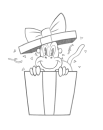The Color Survival Guide features a selection of color theories and color principles that I use almost every day as a commercial artist. I've selected the things that work and are reliable, time and time again.
Over six chapters, distinct principles will be explained in depth. In each chapter you will get a presentation featuring the background color theory of the principle in question, as well as a painting demonstration of where and how I use it in my work and how you can apply it yourself.
Adobe Photoshop will be used in the videos, but the lessons are applicable to every piece of digital painting software. The color theories themselves are fully applicable to traditional media too - though the demonstrations are more targeted to digital painters.














